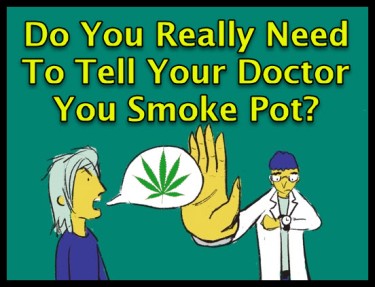
Survey Says Most People Who Take Psychedelics Don’t Tell Their Doctors
Should You Disclose Psychedelic Use To Your Physician?
Some cities in Canada have decriminalized possessing small quantities of psychedelic drugs, such as psilocybin. Alberta became the first state to regulate psychedelic drugs, including MDMA, psilocybin, DMT, and several others. On the other hand, in the United States, more than a dozen states have already decriminalized it but psychedelics remain federally illegal. While psychedelic therapies have not yet been standardized federally in the US, it’s being used in a wide array of settings including licensed clinics, medical trials, and recreationally (albeit illegally). Of course, it would depend on the laws in various cities and states.
But even for people who live in cities that haven’t decriminalized psychedelics, it doesn’t stop them from self-medicating. After all, there is no doubt we are going through a psychedelic revolution, given all the studies coming out of the dark, proving the therapeutic benefits of psychedelics.
On that note, should we be telling our doctors if we are self-medicating with psychedelics?
In a recent survey out of Canada, it was discovered that many people who consume psychedelics aren’t telling their doctors. The survey polled over 2,300 adults, 81.2% of whom admitted that they “never discussed psychedelic use with their health care providers,” reports High Times. Specifically, they found that only a small minority (4.4%) of the participants ever used psychedelics under the supervision of a therapist, and even less in a clinical setting.
The investigators said they “conclude that naturalistic psychedelic use in Canada often includes therapeutic goals but is poorly connected to conventional healthcare, and substance testing is uncommon.”
They added: “Relevant training and education for health care providers is needed, along with more visible options for substance testing.”
That said, should these results be surprising given that psychedelics is still such a stigmatized topic among the public – and moreso with the medical industry? People still aren’t comfortable disclosing their psychedelic use when visiting a doctor’s office. There is also a risk of having their insurance denied.
As it stands, the US Food & Drug Administration just released a set of draft guidelines in June 2023 that would enable them to source psychedelics for the purpose of researching its potential for use in substance use disorders and psychiatric ailments. If things change for the better, hallucinogens and psychedelics as we know it may be as common as marijuana is today. And should things go well, we will see a brighter future for millions of people suffering from conditions that modern pharmaceuticals are unable to treat because of the development of psychedelic-based medications.
A Tricky Situation
There are several instances when you may be prompted to tell a doctor about your occasional psychedelic consumption.
For example, if you are going for a regular checkup and your doctor may see the need to put you on pharmaceutical drugs or prescriptions for a period of time. Take note that potentially dangerous interactions can occur when you do mix certain pharmaceutical drugs and psychedelics. These include psychedelic drugs such as anti-depressants, sleep aids, and even some supplements. Since psychedelic legalization is fairly new, there are only a few studies that have explored the link between psychedelic drugs and those sold in the market right now. Even then, the studies aren’t exhaustive – so you could be placing yourself at risk.
Another situation would be if you are seeking out therapeutic help for your mental health. While there are many doctors and therapists who are already educated – or at least seek out self-study of the subject that is gaining traction across North America – patients can’t assume all doctors have the same level of knowledge or experience. That’s why it can be difficult to talk to your doctor about psychedelics today.
It still wouldn’t be surprising to find doctors who are hesitant to talk about psychedelic drugs in this day and age. The most ideal outcome would be to find a therapist who is open to discussing the pros and cons of drugs in a non-judgmental way because they themselves have the knowledge and background to discuss it in the same way as other pharmaceutical drugs, since all drugs can have potential side effects anyway.
In addition, therapists and doctors can also face the risk of having their licenses revoked if they discuss psychedelics in a place where it’s still illegal. So even if they do know about it, they don’t feel confident discussing it.
What You Can Do
People are going to need medical guidance on psychedelic use sooner or later. The same situation happened before marijuana became legal and widespread. It’s only a matter of time.
But what can you do right now?
If you live in a state where psychedelics are illegal, you may be better off seeking a remote consultation with an experienced healthcare provider. You’ll have to do your research online. Look for medical practitioners who have undergone continuing education in the subject, because they are the most likely able to help you.
If you live in a city where it’s been decriminalized, you can begin the conversation by asking a doctor or therapist if they have had any kind of education on medical uses for psychedelics. For individuals who want to explore the benefits of psychedelics for therapeutic purposes, working with a licensed mental health practitioner who has significant experience and knowledge of these substances is always recommended.
TELLING YOUR DOCTOR THE TRUTH, READ ON…
DO YOU NEED TO TELL YOUR DOCTOR IF YOU SMOKE WEED?
- SEO Powered Content & PR Distribution. Get Amplified Today.
- PlatoData.Network Vertical Generative Ai. Empower Yourself. Access Here.
- PlatoAiStream. Web3 Intelligence. Knowledge Amplified. Access Here.
- PlatoESG. Automotive / EVs, Carbon, CleanTech, Energy, Environment, Solar, Waste Management. Access Here.
- PlatoHealth. Biotech and Clinical Trials Intelligence. Access Here.
- ChartPrime. Elevate your Trading Game with ChartPrime. Access Here.
- BlockOffsets. Modernizing Environmental Offset Ownership. Access Here.
- Source: http://cannabis.net/blog/medical/should-you-tell-your-doctor-if-you-do-shrooms-most-people-dont-tell-their-doctor-about-their-ps




